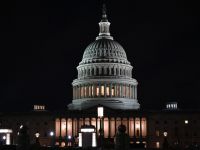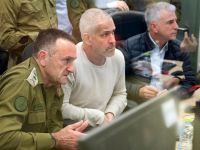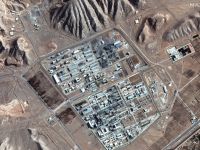By Munir K. Nasser
Washington, DC
The American committee on Jerusalem (ACJ) urged Democratic Vice Presidential candidate Joseph Lieberman to reconsider his position on Jerusalem.
In a letter to Lieberman, ACJ President Rashid Khalidi said it is a matter of deep concern for many people in the world for Jerusalem “to be treated as a matter of Political expediency.”
Khalidi was responding to Lieberman’s statement this week that the piece of land designated for the American Embassy in west Jerusalem is located “ in a part of Jerusalem that was Israeli back to 1948.”
In an exclusive interview with Albawaba.com, Khalidi challenged Lieberman’s premise by stressing that the designated site on which the embassy is to be built “is stolen land.”
He added that the findings of a 3-year investigation by Professor Walid Khalidi, an internationally recognized historian and scholar of the Middle East, proved beyond any doubt that the ownership of that plot is largely a combination of Palestinian private property and Waqf (Muslim religious endowment) property, for which the British government was paying rent until the moment it left Palestine in May, 1948.
Khalidi noted that many of the owners of the land are US citizens. “No US administration should allow a diplomatic facility to be erected on land which is subject to dispute, and some of which is owned by US citizens,” he said.
The following are excerpts of the phone interview conducted with him from his office at the University of Chicago where he is Director of the Center of International Studies:
Q- Why did you send the letter to Lieberman?
A- We wanted to bring two issues to his attention: first of all the fact that the move of the embassy would be a violation of the policy of the Clinton Administration, and the UN Security council resolutions. Secondly, he made a specific statement about the site, which Israel and the United States agreed upon for the embassy as being Israeli back to 1948. We wanted to bring to his attention in particular the research that has been done on behalf of the American Committee on Jerusalem by Professor Walid Khalidi which has uncovered the private owners and the Waqf ownership of land which Israel has leased to the United States essentially under false pretence telling the United States that there was no prior claims to the land, when in fact there is.
Q- What is the message you want to convey to Lieberman?
A- We want to make Lieberman aware of the fact that he was stepping into a minefield because the heirs to the private property and the beneficiaries of the Waqf and the rest of the property include more than 94 people who are US citizens. So it is not just stolen land, the United States has entered into a lease with Israel where Israel has told it something which is not true: that there is no claim to the land; but there is claim to the land.
Q-Is the US government aware that this land is owned by US citizens?
A- We have repeatedly made the State Department aware of this by letters from our lawyer George Salem. We have again and again tried to obtain a meeting with the State Department, but we have failed to do so. So we are now asking for a meeting with the President because of his statement to Israeli television about the possibility of moving the embassy before the end of the year.
Q- Are these owners in a position to sue the US government for their land?
A-This is a case where a suit against the US government might be appropriate.
The US government has entered a lease agreement regarding land property, which is not theirs to dispose off. But that’s not a step we have decided to take. It is a step we are considering in terms of an injunction to stop the lease from going forward.
Q- What impact do you think Lieberman’s nomination as Vice President would have on US policy in the Middle East?
A- One can only hope that should he come into office he will be subject to the same kinds of constraints that every policy maker is subject to: the necessity to move from the purely domestic to statesmanship in foreign policy. Everyone has noted that the Israelis and the American Jewish community would glee with joy over the fact that he is an outspoken supporter of Israel throughout his career. We will be paying close attention to every statement and every action, not because we expect him to be unsympathetic to Israel, but rather expect him as an American elected official, should he be elected, to act in an even handed manner and to give due consideration to the interest of the United States as a co-sponsor of the Middle East peace process.
Q- Is there a possibility for another summit between the US, the Israelis and the Palestinians before the September 13 deadline?
A- It is clear from the Palestinian side there is a desire for another meeting. The Palestinians in fact did not want the last summit. They protested repeatedly, loudly and consistently that the summit should not take place without the proper preparation, and there was no preparation and the summit was a mistake. This is President Clinton and Ehud Barak’s summit. Barak forced it, Clinton agreed to it for his own domestic reasons. There was no justification at that time for a summit and no reason to expect a positive outcome. Unfortunately, the Palestinians were right. Right now, the situation seems somewhat different. It is Yasser Arafat who seems to be holding up the possibility of a summit. So I don’t think the summit is assured yet.
Q- Do you agree with some analysts who say that Barak has broken some taboos on Jerusalem by making concessions on the sovereignty issue?
A- I am not sure to be so ready to leap into praise of Barak as of this moment. But I would say the summit has had a very positive effect in extremely belatedly opening up the question of Jerusalem to rational discussion, and taking it out of the limbo in which the Israeli and American diplomacy has blocked it for over a decade. We have been denied the opportunity to discuss Jerusalem by the highly mistaken interim approach, which was imposed on the Palestinian side for Israeli reasons, that have to do with the welfare of the domestic Israeli politicians. The United States forced it on the Palestinians, and it was a stupid mistake and we are paying the price of a decade of allowing Israeli politicians to pretend that they didn’t have to face their public with the need for significant compromises on Jerusalem. There is a rational possibility of peace and basically the Israeli public opinion was protected from having to confront that fact by American diplomacy, by the Denis Rosses and Aaron Millers and Martin Indyks of this world who would interfere for the Israeli domestic consensus of ignorance about Jerusalem. Eternal; undivided Israeli sovereignty; absolute; all of it, and more. That consensus is a consensus of ignorance. Israel can have those things, of course, but they it can’t have peace.
Q-The Israeli and the US media talk about shared sovereignty in Jerusalem as a matter of fact. Do you see that as a positive thing?
A- The fact that there is a recognition that the Muslim, the Armenian, and the Christian quarters and all the other Arab neighborhoods cannot remain under Israeli sovereignty, frankly represent a big change. This is important in terms of what is acceptable in the realm of public discourse in the United States. For a decade, American public opinion has been prevented from thinking rationally about this topic by the same consensus of ignorance that the Israelis have imposed. It is sort of being an Israeli-imposed dictate. The only solution on Jerusalem is Israeli sovereignty, and the sooner the Arabs accept that, kneel down and surrender, the sooner that we can get down to serious business.
Q-Do you think Arafat will declare a Palestinian state unilaterally on September 13?
A- The question to me is not so much when the Palestinians declare independence. The question is to what extent will a Palestinian state have real sovereignty? Will it control the entirety of its territory and how much that territory would be? Will it control its own space? Will it control its territorial waters? Will it have contiguous borders with Arab states? Will its different parts be connected? If Yasser Arafat declares a state, and he has no control over most of the West Bank, if he has no connection between the 12-14 little bits and pieces he has under his administration, if he has no access to the outside world, I think it is not going to make much of a difference. The question is what kind of sovereignty the new state will have? With what capital?
Q- Can he declare Jerusalem as a capital?
A- If there is an agreed or a unilateral declaration of independence, what happens in Jerusalem? Jerusalem is cut off from the rest of Palestinian territories. If that continues, it would be a bad scenario. If the terms do not include opening up Jerusalem to its Arab hinterland completely, so that people could come from Jenin to Jerusalem in an hour, it is a bad agreement; it is a disaster. If you can’t go pray in the Holy Sepulcher, or in an Armenian church or at al-Aqsa mosque, that’s is a bad deal. I don’t care whether they have a state or a flag or Arafat has his bagpipes, it is not important to me – Albawaba.com
© 2000 Al Bawaba (www.albawaba.com)







